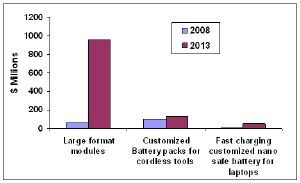Mar 19 2009
Nanostructured or nano-enabled batteries are a new generation of lithium-ion batteries and battery systems to serve applications and markets outside the historical domain of lithium-ion. Nanotechnology innovations are driving advances in battery technology where nanomatrials are finding use as new battery materials. Enormous leverage can result from advances in cathodes, anodes and electrolytes used in the batteries. Lithium-ion cells represent the basic building blocks of batteries proposed for the next generation of advanced hybrid electric vehicles (HEVs), electrical vehicles and specialty vehicles.
 GLOBAL MARKET SIZE FOR nano-enabled batteries by type, 2008 AND 2013 ($ Millions)
GLOBAL MARKET SIZE FOR nano-enabled batteries by type, 2008 AND 2013 ($ Millions)
According to the new iRAP report, Nano-enabled Batteries for Portable and Rechargeable Applications: Types, Applications, New Developments, Industry Structure and Global Markets, the global market for nano-enabled batteries is estimated to have reached $169 million in 2008. With an AAGR (average annual growth rate) of 46.3%, this market is expected to reach $1.13 billion by 2013.
The next generation of lithium-ion batteries has improved safety characteristics, in part through the use of alternative nano-sized materials, in particular, nano-phosphate materials. Traditional lithium-ion technology uses active materials with particles that range in size between 5 and 20 microns. The use of phosphates, in lieu of oxides, for the nanomaterials is one reason for these increased power rates and temperature ranges. Both phosphates and oxides are naturally occurring substances that are used in battery cathodes.
Among the three types of nano-enabled batteries, customized batteries for power tools had the highest market share of 59.2% in 2008, followed by large format modules with 37.8%, and a small 3% share for fast charging customized nano safe battery for laptops. By 2013, large format modules for hybrid electric vehicles (HEVs), plug-in hybrid electric vehicles (PHEVs), electric vehicles (EVs) and specialty vehicles will have 84.7% of the global market, with an AAGR of 71.8% from 2008 to 2013.
The global nano-enabled battery industry is characterized by over a dozen companies involved in the industry as manufacturers and developers. The iRAP study identified over a dozen manufacturers and developers of nano-enabled batteries. These include A123 Systems, Toshiba, Altairnano, Valence, mPhase, Nanoener, and nGimt. These companies are driving the technology to meet market needs. There are also over 20 suppliers of nanomaterials used in nano-enabled batteries.
The report provides separate comprehensive analyses for the U.S., Japan, Western Europe, China, Korea, and the rest of the world. Forecasts are provided for each region for the period 2008 through 2013. Cost analysis of nanostructured batteries, analysis of global patents activity and market competition and dynamics in the new technology are also analyzed.
GLOBAL MARKET SIZE/PERCENTAGE SHARE FOR nano-enabled batteries by type, 2008 AND 2013
|
Type
|
2008 ($ millions)
|
2008 (%)
|
2013 ($ millions)
|
2013 (%)
|
AAGR (%) 2008-13
|
|
Large format modules
|
64
|
37.8
|
960
|
84.7
|
71.8
|
|
Customized battery packs for cordless tools
|
100
|
59.2
|
123
|
10.8
|
4.2
|
|
Fast charging customized nano safe battery for laptops
|
5
|
3
|
50
|
4.5
|
58.4
|
|
Total
|
169
|
100
|
1133
|
100
|
46.3
|
Data and analysis extracted from this press release must be accompanied by a statement identifying iRAP, Inc., P.O. Box 16760, Stamford, CT 06905, USA, Telephone: (203) 569-7909, Email: [email protected] as the source and publisher, along with report number, which can be found in the first paragraph of this release.